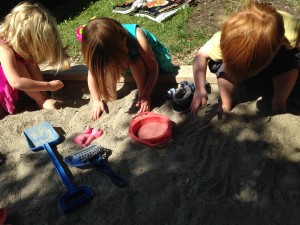What seeds are the essentials for growing a child’s brain? According to John Medina, author of Brain Rules and Brain Rules for Baby, they are:
- The desire to explore
- Self-control (executive function)
- Creativity
- Communication skills—Non-verbal/Verbal
Children need human interaction to learn. Learning is relational! We learn best from other human beings. Spend some time interacting with your child and giving them the building blocks (or seeds) that they can use for a lifetime.
Enjoy your garden!
The Desire to Explore
The desire to explore their world needs to be fulfilled in a safe and unstructured environment. Give your child opportunities to make choices about what they are doing, see connections, ask questions – “why?” and “what if?”. They need to touch, taste, hear, tinker, take apart, put together and just BE in their world in order to engage their brains in learning.
What to expect:
- It will (most likely) be messy.
- It can be time consuming. Young children are not known for staying on a precise schedule.
- It can be joyful. Seeing the world as your child does.
- It can be amazing. Watching your child as he/she grasps a new thought, idea, concept.
Play in the backyard without an agenda.
Dig in the dirt, examine a plant, watch a bug, explore nature.
Get involved.
It takes time — your time — to give your child a safe area in which to do this. You have to engage your child in activities that will promote open-ended exploration.
Self-control (executive function)
Can a child have self-control? It is something you need to help your child develop. Self-control is also known as executive function. It is the ability to stop one’s self from doing something, to think about the consequences, to take responsibility for one’s words and actions.
Executive function is a better indicator of academic success than one’s IQ. According to John Medina, executive function controls planning, foresight, problem solving and goal setting.
If you can delay your actions (control yourself), you will do better in school and the workplace.
If you can filter out distraction and stay on course, you will be better at staying on task.
It is important to help your child develop good impulse control techniques. Teaching them to take a breath, count to 10 or stomp their foot when they are mad rather than throw the toy, hit their sister, bite their friend. Is this easy? No. Does it take time? Yes. Will it be worth it in the end? YES!
You want your child to explore the world but you want them to be able to control their body while doing so. They need to learn that:
- there is a time to explore and a time to sit;
- a time to be involved in their own activities or thoughts and a time to engage with or listen to others;
- a time to take a chance and a time to be cautious.
Teaching your child when and how to use self-control is one of the most important lessons you can teach them.
The more practice they have at delayed gratification (staying on task when they are working on a project — concentrating on a task) the better the brain becomes at controlling behavior.

